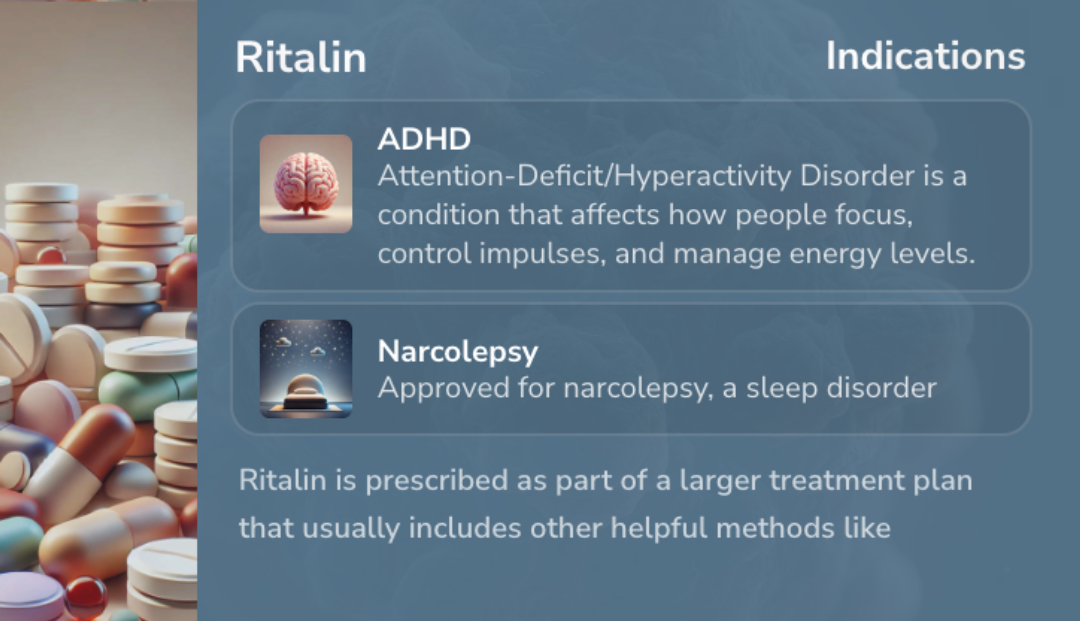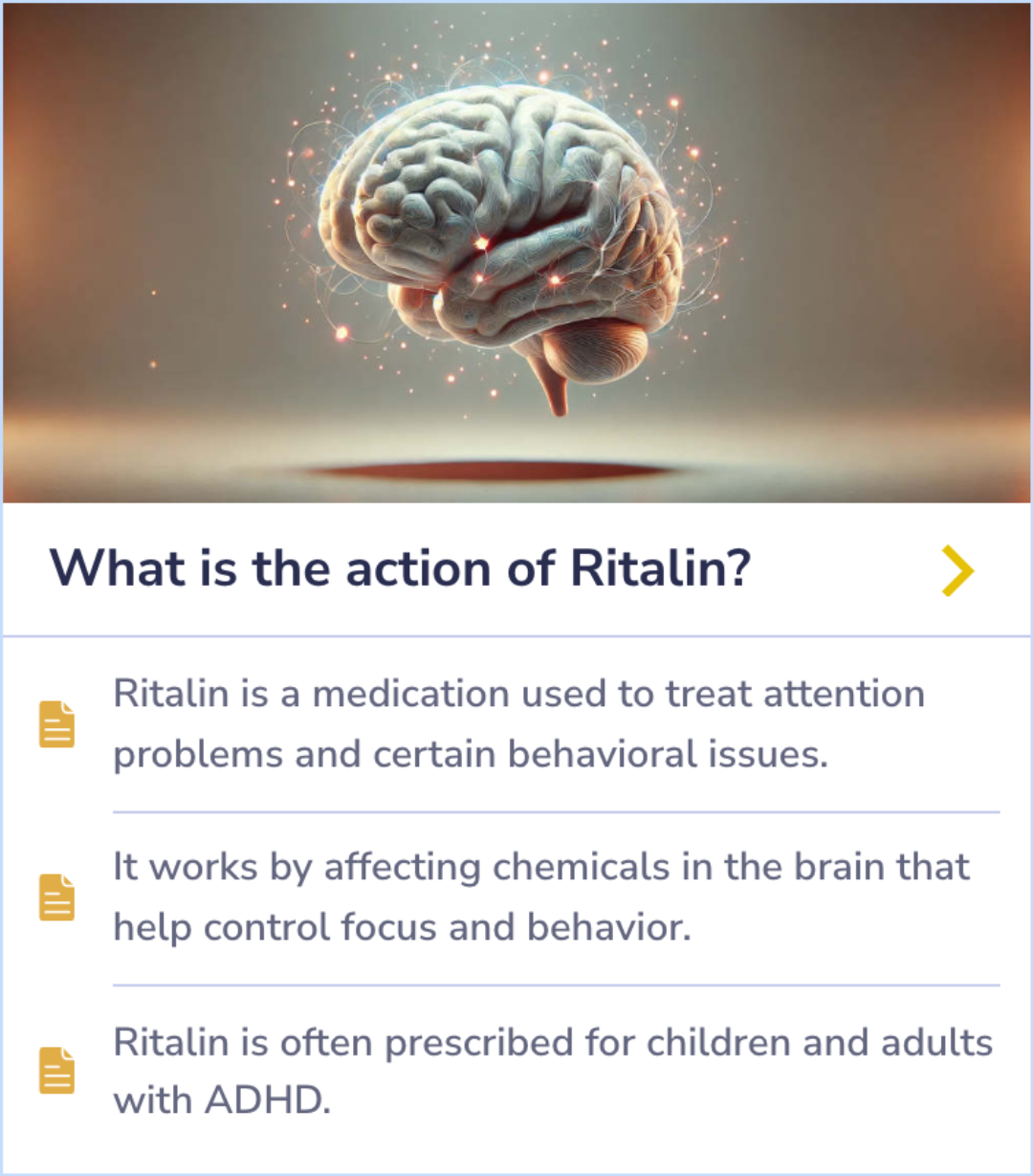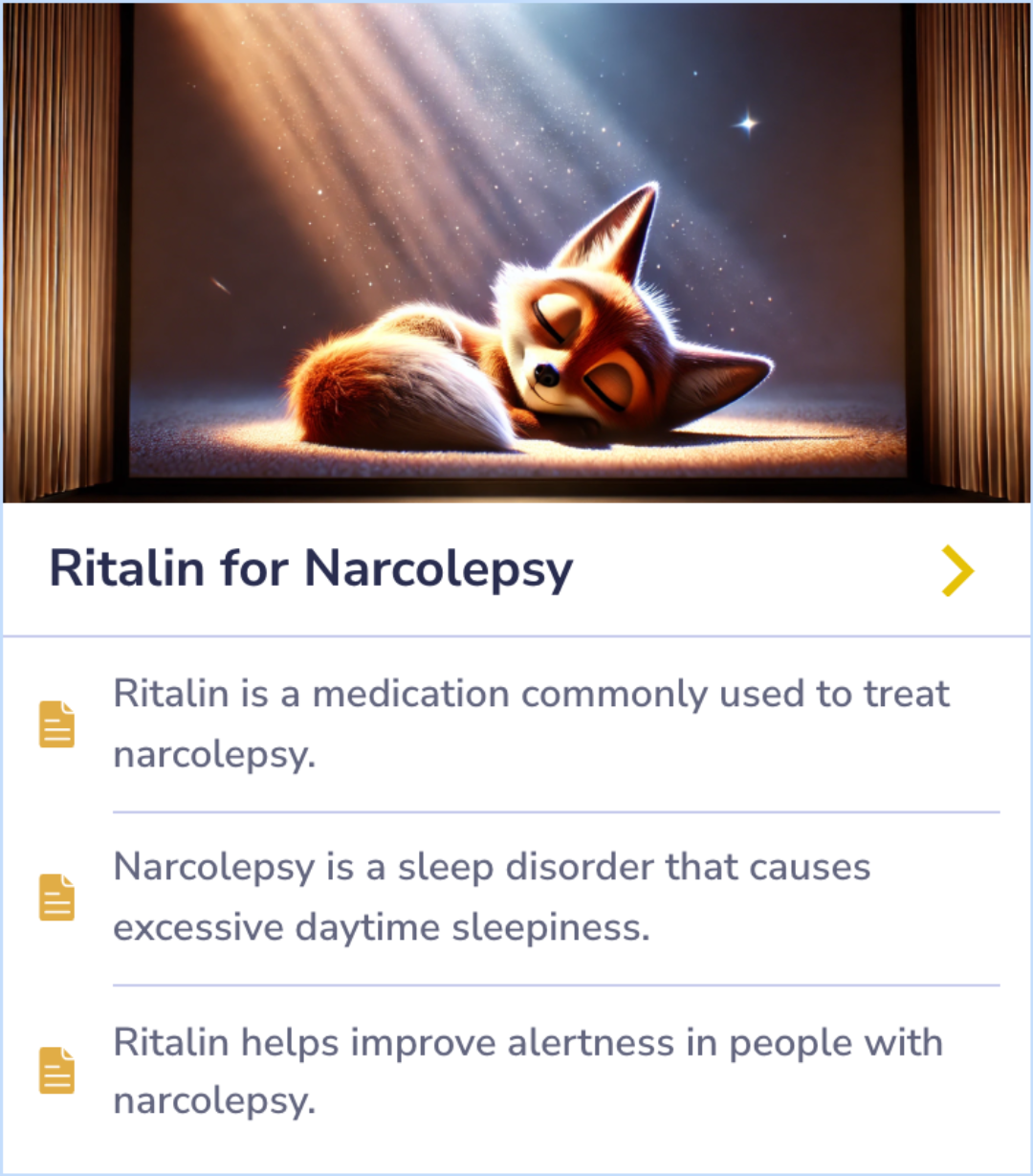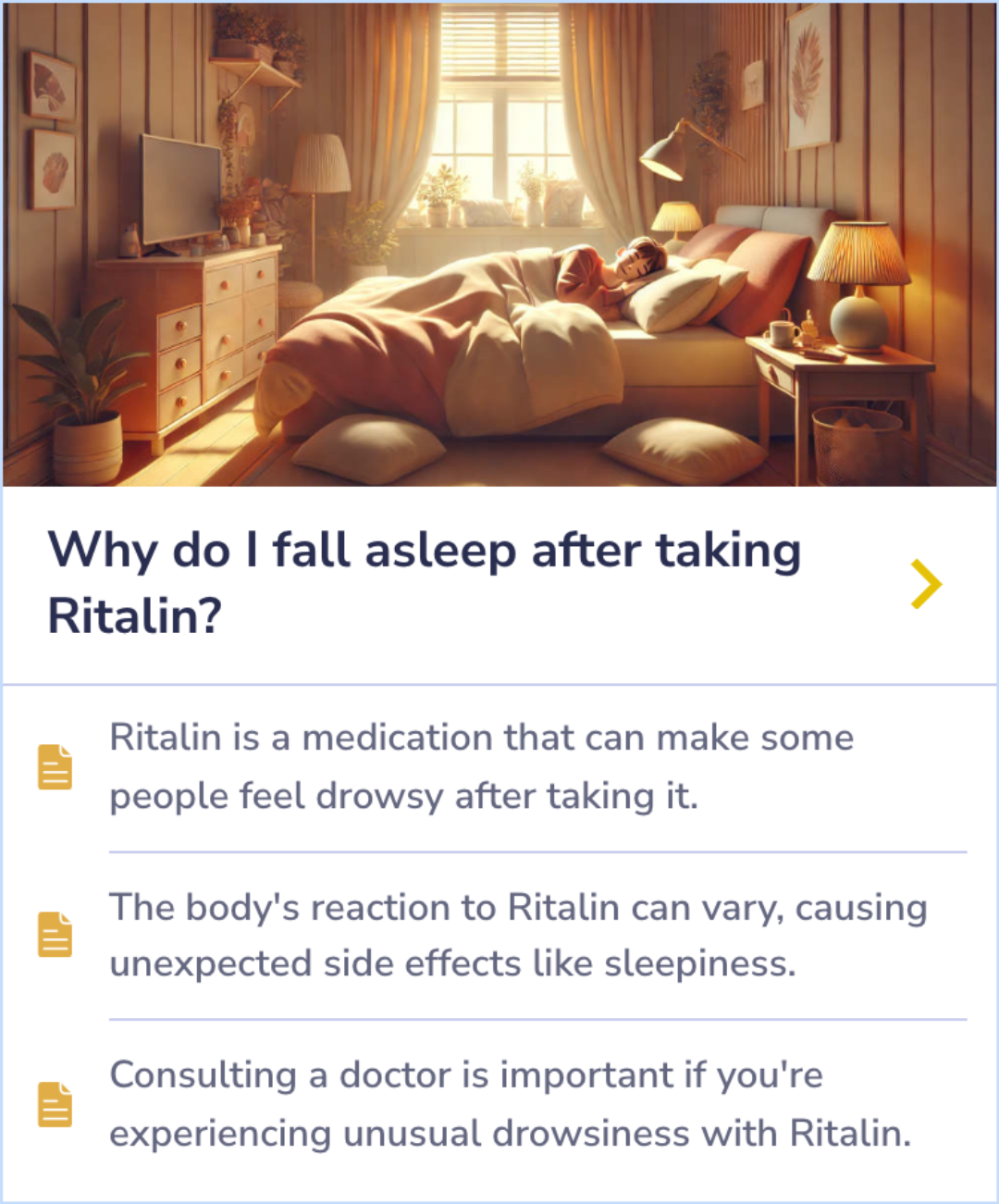Ritalin
Evidence Based Answers
Ritalin Indications Overview
Ritalin is approved for ADHD and narcolepsy, influences brain chemicals to manage symptoms, and shows varied effectiveness and side effects in children and adults.
Published: November 9, 2024

Ritalin treats ADHD and narcolepsy by boosting neurotransmitters, shows different effects based on age group.
Approved Uses of Ritalin
Ritalin (methylphenidate) is approved to treat attention-deficit/hyperactivity disorder (ADHD) in both children and adults, as well as narcolepsy. It works by influencing neurotransmitters like dopamine and noradrenaline to improve attention, reduce hyperactivity, and control impulsivity.
Clinical studies show Ritalin's effectiveness in managing core ADHD symptoms, although individual responses can vary.
Clinical studies show Ritalin's effectiveness in managing core ADHD symptoms, although individual responses can vary.
“
Source Quotes:
The Food and Drug Administration has approved methylphenidate for the treatment of attention-deficit/hyperactivity disorder and narcolepsy.
Methylphenidate is FDA-approved for treating attention deficit hyperactivity disorder (ADHD) in children and adults and as a second-line treatment for narcolepsy in adults.
How Ritalin Works
Ritalin functions as a central nervous system stimulant by preventing the reuptake of dopamine and noradrenaline, which increases their availability in the brain. This helps reduce symptoms of hyperactivity, impulsivity, and inattention in ADHD.
The drug is available in different forms, including immediate-release and extended-release options, which provide varying durations of therapeutic effects.
The drug is available in different forms, including immediate-release and extended-release options, which provide varying durations of therapeutic effects.
“
Source Quotes:
Methylphenidate exhibits multimodal mechanism of action, working primarily as a dopamine and noradrenaline reuptake inhibitor.
The treatment of both ADHD and narcolepsy have significantly better outcomes when used concurrently with nonpharmacologic therapies (i.e., social skills training in ADHD or sleep hygiene measures in narcolepsy).
Ritalin for ADHD: Children vs. Adults
Ritalin is used for ADHD across all age groups, but its effectiveness and side effects can differ. In children, it is often combined with behavioral therapy. Adults with ADHD may see improvements in attention and impulse control but might experience side effects like appetite loss and heart palpitations.
Adjusting dosages based on individual responses can enhance benefits and reduce side effects.
Adjusting dosages based on individual responses can enhance benefits and reduce side effects.
“
Source Quotes:
Methylphenidate is the most widely used medication for the treatment of ADHD.
In placebo-controlled trials, MPH was shown to be moderately effective both against the core ADHD symptoms and the accompanying emotion regulation deficits.
Ritalin: Side Effects and Management
Common side effects of Ritalin include decreased appetite, dry mouth, and heart palpitations, which may occur during long-term use. The severity varies among individuals and can be managed by adjusting the dose.
Some patients experience agitation or restlessness, but these symptoms often improve with proper care.
Some patients experience agitation or restlessness, but these symptoms often improve with proper care.
“
Source Quotes:
The most common adverse events related to long-term treatment with MPH are decreased appetite (~ 20%), dry mouth (15%), heart palpitations (13%), gastrointestinal infections (~ 10%), and agitation/feeling restless (~ 10%).
Mild adverse effects may resolve with time or can be addressed by adjusting the dose, time of administration, or formulation of stimulant.
Key Takeaways
Conclusions
Ritalin (methylphenidate) is a central nervous system stimulant primarily approved to treat ADHD in both children and adults, as well as narcolepsy. It operates by increasing the availability of neurotransmitters like dopamine and noradrenaline, thereby reducing ADHD symptoms such as hyperactivity and impulsivity.
While effective, the response and side effects can vary significantly across individuals and age groups. Its usage involves careful dose adjustments to optimize benefits and mitigate side effects like appetite loss and heart palpitations, showcasing its tailored approach in therapeutic settings.
While effective, the response and side effects can vary significantly across individuals and age groups. Its usage involves careful dose adjustments to optimize benefits and mitigate side effects like appetite loss and heart palpitations, showcasing its tailored approach in therapeutic settings.

Evidence Summary
How Ritalin Improves Focus and Behavior
Ritalin, commonly used for ADHD, works by affecting chemicals in the brain linked to focus and behavior. It's prescribed for both children and adults to enhance concentration and manage behaviors.
Ritalin’s ability to modify brain activity helps users manage symptoms such as inattention and hyperactivity. Prescriptions vary based on individual needs, and its effectiveness often leads to better control over behavior.
Different formulations allow tailored treatment for specific cases, enhancing therapeutic effects.
Ritalin’s ability to modify brain activity helps users manage symptoms such as inattention and hyperactivity. Prescriptions vary based on individual needs, and its effectiveness often leads to better control over behavior.
Different formulations allow tailored treatment for specific cases, enhancing therapeutic effects.
Evidence Summary
Ritalin’s Role in Managing Narcolepsy
Ritalin helps people with narcolepsy manage daytime sleepiness, improving their ability to stay awake and alert. By enhancing focus, it supports those affected by this sleep disorder in staying attentive and more energized throughout the day.
Its primary role in narcolepsy treatment involves counteracting excessive drowsiness, enabling individuals to maintain a steadier level of alertness during daily tasks.
Its primary role in narcolepsy treatment involves counteracting excessive drowsiness, enabling individuals to maintain a steadier level of alertness during daily tasks.
Evidence Summary
Unexpected Drowsiness with Ritalin Use
Ritalin, commonly used for treating attention issues, can sometimes lead to unexpected drowsiness, with effects that differ from one person to another. This reaction may come as a surprise since the medication is known for its stimulating effects.
Individuals experiencing drowsiness while on Ritalin should discuss these side effects with their healthcare provider to explore options for reducing or managing this response.
Individuals experiencing drowsiness while on Ritalin should discuss these side effects with their healthcare provider to explore options for reducing or managing this response.


